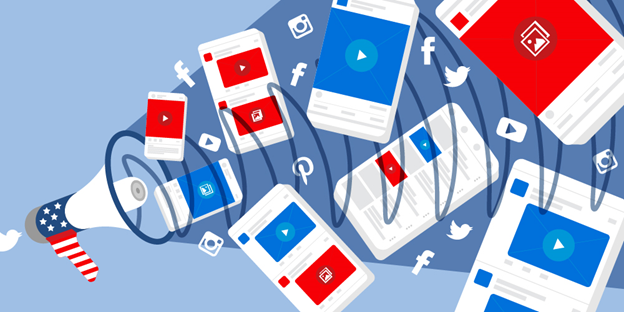Social media and Politics: How Interrelated they Are?
The different types of social media are nowadays used by many different kinds of organizations, in many different fields. Politics are no exception. The growing use of social media has vital implications for the political process in most countries around the world. Social media has increasingly been embraced by politicians, activists, and social movements as a new way to communicate and reach citizens that they could not interact with.

Using social media can be very beneficial for political leaders, candidates, and parties as well. There is no doubt that personal communication via social media such as Facebook, Twitter brings political leaders closer to their potential voters and allows them to communicate faster and reach citizens in a more targeted manner. Also, it is the cost-effective platform for discussions and engagement with the country’s citizens. Through social media reactions, feedback, conversations, and debates can be conducted online as well as support and participation for offline events, which also allow new audiences to be reached.
National leaders, election candidates, and official government organization are now active on social networking sites. The interactive nature of social media can help them to clarify their program to acknowledge better to the citizen’s expectations. Nowadays politicians, political parties, and candidates also use social media to reach voters, and especially the youth generations. The new trend is to connect directly with voters as a friend, like on Facebook. It is also very easy and cost-effective to create and publish commercials for free on YouTube and other social sites, rather than doing a campaign on TV or radio. Social media has motivated younger voters. As we know most today’s youths don’t watch the news daily, but most do check social media, and it has had a deep impact on elections. President Obama was the first politician to use the power of social media for successful campaigns. Also, we cannot deny that the U.S. President Trump’s campaign was extremely effective and it helped to win him the election.
In Nepal, while some individual leaders have had a first mover advantage, the government has also tried to play catch up by using social media as an extension of their daily business. The government organization Hello Sarkar is on social networking site Facebook and on Twitter as @Hello_Sarkar where people can directly complain about the injustice. Now President and Prime Minister are on social media and these accounts update the political and national updates. Most of the political leaders are also on social networking sites. Some leaders connected to people through tweets, some are more active than the others while most use Social media to share information, rally locations, and give reactions to the news.
Social media is seen as a great way in communication between citizens and elected politicians, with the growing access to information, the chance for feedback and transparency. Being active on social media can be a beneficial thing, for politicians and political parties but only when it is well handled. So, one has to be careful when using social media for political matters, as it can have some counterproductive effects.
